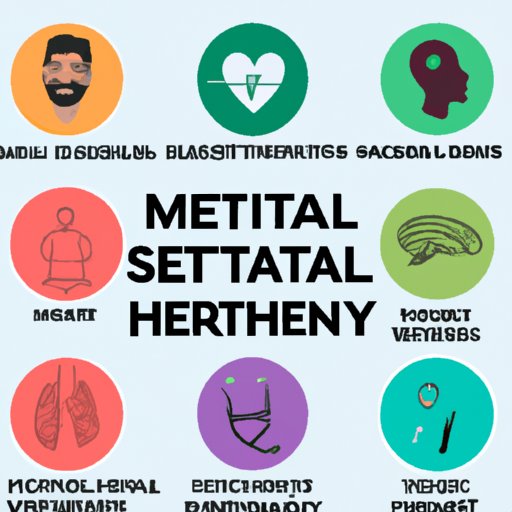Introduction
Mental health is an important part of our overall wellbeing. It’s defined as the condition of our psychological and emotional state that affects how we think, feel, and act in our everyday lives. Poor mental health can lead to feelings of sadness, anxiety, and low self-esteem, which can have a negative impact on our physical health, relationships, and daily activities.
Get Adequate Sleep
Getting enough quality sleep is key to maintaining good mental health. The National Sleep Foundation recommends 7-8 hours of sleep each night for adults. To get the best rest possible, try to stick to a consistent sleep schedule. Go to bed and wake up at the same time every day, even on weekends.
Exercise Regularly
Physical activity is another important factor when it comes to promoting mental health. Exercise boosts endorphins, which are hormones that make us feel better and happier. It can also reduce stress levels, improve concentration, and help us sleep better. Aim for 30 minutes of exercise 3-5 times a week. This could be anything from going for a jog to taking an online fitness class.
Eat a Healthy Diet
Eating nutritious food plays an important role in our overall wellbeing. Focus on consuming plenty of fruits, vegetables, whole grains, and lean proteins. Avoid processed foods high in sugar, fat, and salt. Eating a balanced diet will provide your body with the nutrients it needs to stay healthy and energized.
Connect with Others
Social connection is also essential for maintaining good mental health. Humans are social creatures, and having meaningful relationships gives us a sense of belonging and purpose. Make an effort to connect with family and friends, both in person or virtually. If you don’t have many close relationships, look for ways to meet new people, such as joining a club or volunteering.
Take Time for Yourself
It’s important to carve out time for yourself to relax and unwind. Try activities like reading, listening to music, or spending time in nature. Taking breaks throughout the day can also help reduce stress levels and clear your mind. Doing something creative such as painting or playing an instrument can also help boost your mood and self-confidence.
Practice Mindfulness
Mindfulness is the practice of being aware of the present moment without judging it. It can be achieved through activities such as yoga and meditation. Research has shown that mindfulness can help reduce stress and anxiety, boost mood, and enhance concentration. Making time for mindfulness can help you become more in tune with your thoughts and emotions.
Seek Professional Help When Needed
If you’re struggling with your mental health, it’s important to seek professional help. Signs that you may need help include feeling overwhelmed, avoiding activities you used to enjoy, and feeling isolated. There are several resources available to get help, such as therapy and support groups. Don’t be afraid to reach out and ask for help if you need it.
Conclusion
Good mental health is essential for overall wellbeing. Taking care of yourself by getting adequate sleep, exercising regularly, eating a healthy diet, connecting with others, taking time for yourself, practicing mindfulness, and seeking professional help when needed are all important steps in maintaining good mental health. By prioritizing your mental health, you can live a happier and healthier life.
(Note: Is this article not meeting your expectations? Do you have knowledge or insights to share? Unlock new opportunities and expand your reach by joining our authors team. Click Registration to join us and share your expertise with our readers.)
